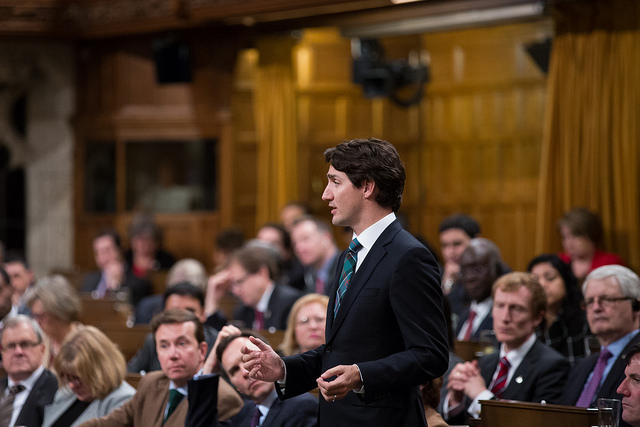Less than a week after the federal government refused to direct government-owned Via Rail to place a billion-dollar order for new rail cars with Quebec-based Bombardier, it announced a multi-year package worth more than $1.5 billion for Alberta’s oil and gas industry. The two decisions show how politically fraught the world of industrial strategy can be.
The Trudeau government’s moves, especially so close together, failed to elicit whoops of joy from its target audience out west and has prompted accusations of failing to protect jobs and create new ones in Quebec towns like La Pocatière, northeast of Quebec City, where Bombardier has a major production facility.
The Crown-owned railway last week announced it is giving its business to the German mega-corporation Siemens.
A good piece of the $1.5 billion in aid to the oil and gas industry announced December 18 will be in the form of loans by two government agencies, Export Development Canada and the Business Development of Bank of Canada, to aid oil patch companies find new markets. But Alberta Premier Rachel Notley points out that finding markets is not the industry’s problem. What hobbles it, she says, is the lack of means – be they pipelines or rail cars – to get product to market.
Oil and gas industry spokespeople add that while they appreciate the government’s solicitude, most companies have not been looking for government handouts. In fact, experts say the $1.5 billion will only really help smaller industry players, who might be having difficulty attracting private capital right now.
Environmentalists have their own reasons to be unhappy about this new financial commitment to oil and gas. When you put it together with the more than $4 billion to buy the Kinder Morgan pipeline, they say, it shows the Trudeau government, despite its brave talk, is moving backwards not forwards to meet Canada’s greenhouse gas emissions targets.
German company to build rail cars for Canada in the U.S.
The Liberal government and Via Rail management both say they could not give any preference to home-grown company, and the jobs it would create, because of trade deals with Europe and the U.S. The winning bidder, Siemens, has offered to consider Canadian sub-contractors for up to 20 per cent of the work on the Via Rail order, but makes no firm commitment. The German company will likely do the lion’s share of the work at its California facility.
Workers in La Pocatière point out that American rules requires 65 per cent of any public transit related manufacturing be done in the U.S. They wonder why Canada cannot do the same.
In Parliament, the NDP echoes that view. New Democratic MPs also say Quebec workers are victims of a bad trade deal – the Comprehensive Economic and Trade Agreement or CETA – that Canada signed with the European Union last year. When the Siemens deal was announced, the NDP trade critic, Tracey Ramsay, told the House of Commons:
“The Liberal government refused to award a billion-dollar contract to Canada’s Bombardier … because they know that using Canadian companies for procurement can get us sued by the EU under the investor-state provisions in CETA. When the Liberals called CETA a gold standard in trade, Canadians had no idea that meant giving away their jobs to foreign companies.”
A collective face palm
There is no way the prime minister and his colleagues can make a silk purse out of this sow’s ear. They can hardly claim it is good thing for the workers of La Pocatière that workers in California will be building railways that will run from Quebec’s capital, through the federal capital to Ontario’s capital and beyond.
The best the Liberals can offer is bland boiler-plate generalities on the long-term value of freer trade and open borders. On December 11, the prime minister put it this way:
“Signing trade deals allows us to access procurement opportunities around the world so that we can see things like Bombardier trains in Africa, in Asia and around the world. We will continue to promote the extraordinary quality of the work that is done by Canadian companies around the world. We know that as we engage in trade we create better opportunities for our workers and for all Canadians.”
The response of NDP parliamentary leader Guy Caron seems, in this case, quite apropos.
“Mr. Speaker, when the prime minister tries to make us believe that the contract given by VIA Rail for a German company to build trains in the U.S. is the best thing that can happen, we can feel a collective face palm from Canadians …”
And so, as the year comes to an end, the Trudeau government has managed to annoy most Albertans, a good part of the environmental community and a significant group of workers and businesspeople in Quebec. It’s all in a day’s work, perhaps an inevitable consequence of governing such a vast and diverse country.
Karl Nerenberg has been a journalist and filmmaker for more than 25 years. He is rabble’s politics reporter.
Photo: Justin Trudeau/Flickr
Help make rabble sustainable. Please consider supporting our work with a monthly donation. Support rabble.ca today for as little as $1 per month!




